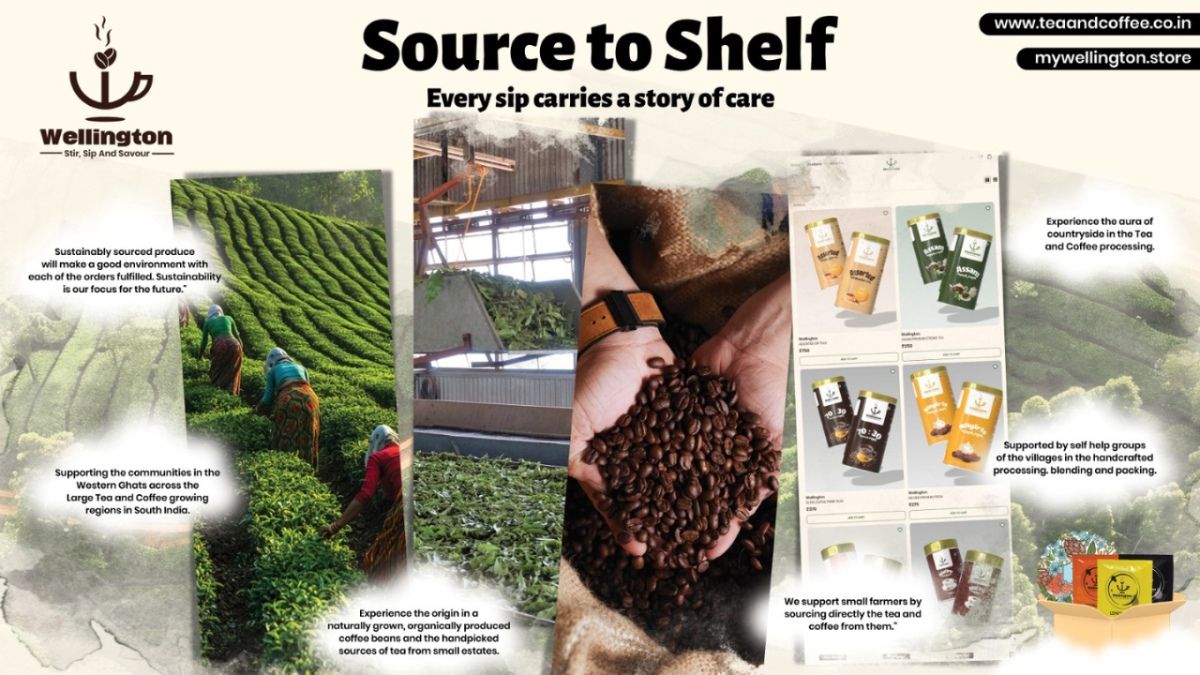A journey of a decade from the rural regions of India to the retail shelves in the city — an interesting timeline for the tea and coffee industry, an emergence from varying weather patterns to a solidifying state in the tea factories. The emphasis can’t be more on sustainability, and that is the brand theme of Wellington Tea and Coffee.
A challenging time in the industry with various cost and market factors, has created a distinct requirement to identify the economies. The shift from the basic to speciality-bound coffee shops has placed more emphasis on quality — an emerging trend with various market players and their successful business models.
What Distinguishes the Wellington Transformation?
From estate operations to forging partnerships and implementing best practices, there hasn’t been much that has not been accomplished in the source-to-shelf model of the company. Yet, the domestic market has to be aligned with the source to make it successful.
An early impact in the D2C model was a turning point and led to the consolidation of the best products to suit customers. The website (www.teaandcoffee.co.in) features collections of the best organic teas, speciality coffee, iced teas, and premium Nilgiris and Assam teas.
All products are aligned toward the premium segment and, at the back end, support the thriving of estates and their sustainability. The support to the communities and their livelihoods has been commendable, with partnerships formed with self-help groups.
The Group MD, Mr Raja Rajan Vasu, has been at the centre of developing various partnerships to make Wellington a long-term success across the Indian market.
Wellington – Stir, Sip and Savour: A Direct-to-Consumer Brand in the Tea and Coffee Industry
A source from the countryside is not only organic but also a sustainable business continuity solution. This is emphasised through year-over-year operations — farmer sourcing, processing in small business units and roasters — making a difference in the community.
The origin of speciality coffee in the Coorg and Chikmagalur regions of Karnataka and support from the Nilgiris region, create a balanced approach to coffee sourcing. Processing ranges from local units in these regions to larger facilities in Karnataka, ensuring year-round supply.
The best of speciality isn’t just in farming practices but also in viable business partnerships for processing. This includes mechanisation and AI-driven technology in the Nilgiris processing units, ensuring top-quality output.
Enhanced-capacity roasters maintain consistent quality with medium to dark roasting. Overall, quality is enhanced with less than 2% of lower-quality beans — on par with export standards for the local market.
This extends to blending with chicory and packaging within e-commerce-supportive units. A sustainable strategy remains key to success, balancing supply, market, and pricing dynamics.
The Tea Story: A Narrative of Sustainability
The estates have transitioned toward sustainable practices, upgrading the variety and quality of teas — from basic black teas to green, masala, and lemon teas — adding both flavor and value.
A wide assortment of teas comes from partner companies, contributing to the best supplies from the Nilgiris region. High customer ratings continue to support the sustainable operations of estates, as the sources are primarily small farmers supporting local tea factories.
Carbon emission offset is an emerging trend, marking a distinct contribution to sustainability through continuous operations. The Fair Trade, Rainforest Alliance, and IMO certifications of the factories further solidify Wellington’s long-term commitment to sustainability in its e-commerce backend model.
A Sustainable Vision for the Future
As a true sustainability-driven organisation, Wellington has implemented comprehensive value addition in tea and coffee processing, making it the first of its kind in the Kotagiri region.
“The support that it brings to the e-commerce platform is great, and ensuring sustainability in our operations is seamless,”
said Sanchitaa N, E-commerce Manager at Wellington.
“This has led us to go a mile further in developing new products specifically for the platform and catering to the premium segment customers.”
Wellington’s journey continues as it integrates the Direct-to-Consumer model with operations, ensuring sustainability at every stage of the supply chain.
To celebrate the Diwali season, the brand has also developed sustainable hampers, available on its website — www.teaandcoffee.co.in.
A season to cherish with festivities, and Wellington’s hampers go a long way in fulfilling their commitment to customers.


